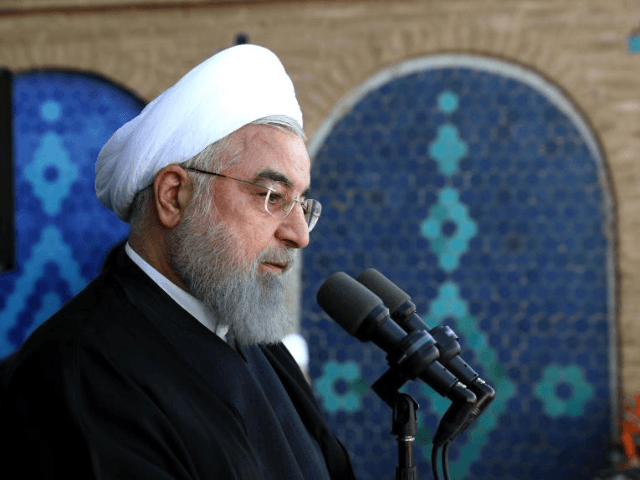The Iranian government officially reported total oil revenue from the past fiscal year as just $8 billion dollars, an astonishing loss of $92 billion from the revenues enjoyed by the terrorism-exporting theocracy before President Donald Trump withdrew from the nuclear deal and reimposed sanctions.
The totals provided by Iranian Vice President Eshaq Jahangiri were reported on Sunday by Kurdish news service Rudaw, which noted the Iranian calendar year begins in the middle of March.
Jahangiri, of course, described the 90 percent revenue drop as a terrible injustice against Iran, not a success of President Trump’s “maximum pressure campaign” to scuttle the Iranian nuclear weapons program and halt Tehran’s support for terrorism and destabilization across the Middle East.
“The sanctions have exerted enormous pressure on the people of Iran, the economy was damaged but it was not destroyed and it is still standing on its feet. Life for people has become difficult but the government is trying to relieve these pressures,” Jahangiri complained.
Outside estimates of Iran’s oil revenue and its losses to sanctions are considerably lower than the figures provided by the Iranian vice president. The U.S. government in May estimated that Iran lost about $10 billion in revenue after sanctions were restored, while OPEC’s estimate of the total volume of Iranian exports is about $60 billion.
Iranian state budget planner Mohammad Bagher Nobakht said in early June that Iran’s oil revenues are down to about $8.9 billion from a peak of $119 billion ten years ago. Not all of the losses were related to sanctions; the crash in world oil prices certainly played a major role. Nobakht said Iran planned to adjust to changing fiscal realities in the oil business by putting a greater emphasis on manufacturing.
As Rudaw pointed out, Iran still has plenty of money to spend on weapons despite these alleged hardships. Iran is currently pressuring allied powers to thwart the U.S. effort to extend an arms embargo against it – an embargo that would be purely symbolic if an impoverished Tehran was spending all of its money on the welfare of its own citizens.
Iran is pressuring South Korea to release some $7 billion in oil revenue, declaring Seoul’s hefty humanitarian contributions during the coronavirus epidemic to be insufficient. The Iranians want South Korea to set up an alternative banking system that would bypass U.S. sanctions, similar to the system created by the European Union, which is still participating in the Iran nuclear deal.
“It is appalling to see that Korean banks have conveniently neglected their obligations, common international financial agreements, and decided to play politics and follow illegal and unilateral U.S. sanctions,” Abdolnaser Hemmati, head of the Iranian central bank, railed last week.
Iranian government spokesman Ali Bariei said on Monday that South Korea’s reasons for keeping Iranian assets frozen “are not acceptable to us from various aspects.”
“We, and the people of Iran, naturally expect the South Korean government to return the money to Iran with its measures. The consequences of this behaviour are unacceptable to all of us and will definitely affect the prospect of bilateral relations and future cooperation,” he said.
The Iranian opposition was not displeased to learn that the regime’s wallet is empty. The National Council of Resistance of Iran (NCRI) welcomed Jahangiri’s comments as a sign that Tehran will have less money for its “illicit activities,” including “funding terrorist proxy groups abroad” and financing “oppressive forces inside Iran.”
NCRI noted that much of Iran’s oil wealth during its windfall days “simply vanished in the regime’s black hole of institutionalized corruption and embezzlement.”
“The regime needs money to fund its illicit activities. As the international pressure on the regime continues to grow, particularly amid the COVID-19 pandemic, the regime continues plundering people’s wealth, resulting in more poverty. Considering the public dissatisfaction and anger of the Iranian people against this regime, which has resulted in the great uprisings of 2017-2019 and the beginning of 2020, a bleak future awaits the mullahs’ regime,” NCRI predicted.

COMMENTS
Please let us know if you're having issues with commenting.